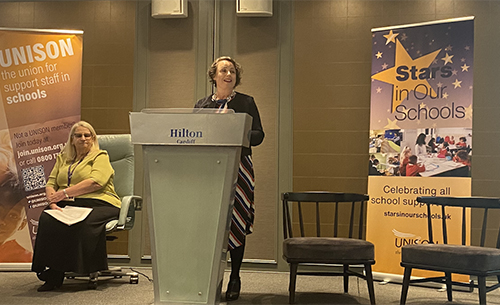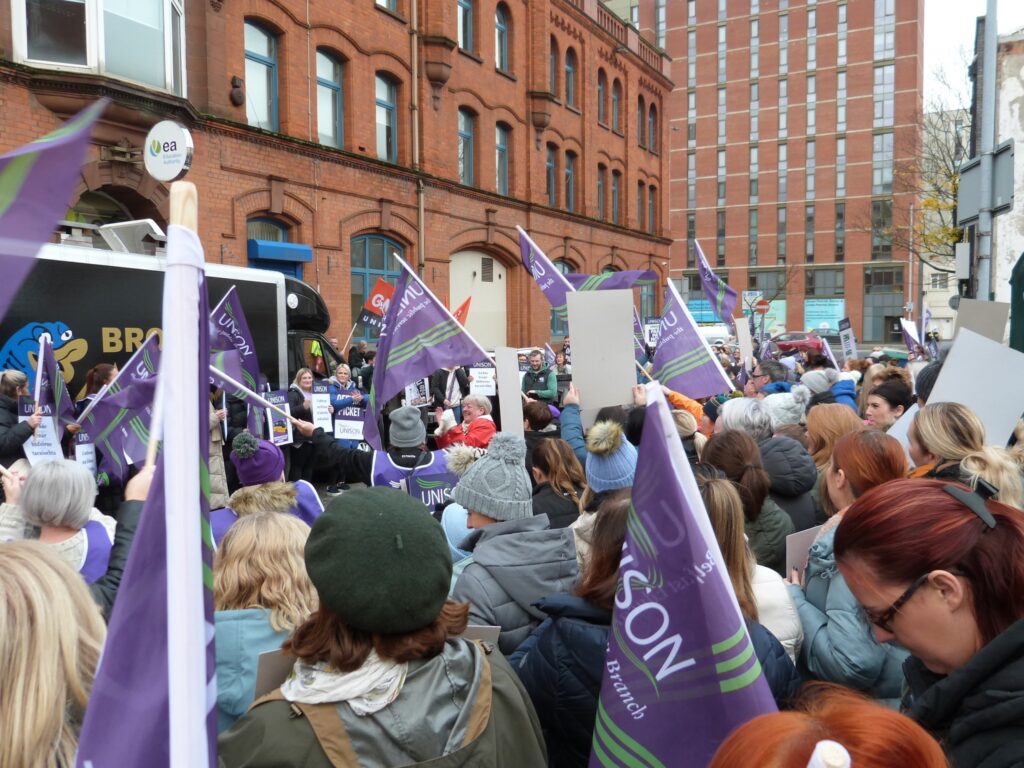Image: Steve Forrest/Workers’ photos
Focus turned to education on Monday afternoon at local government conference with a series of motions on further education, the crisis in schools, and the school support staff negotiating body (SSSNB).
Mike Short national secretary for local government and education opened the session with a speech outlining the achievements over the last year and the challenges they will face in the years to come.
Moving a motion on further education (FE) pay Carl Greatbatch spoke of the “vital role” FE played in his life. crediting his ability to become a trade union officer to the vital support he was given by FE, adding that he was proud that FE had also enabled his daughter to follow in the same path.
The motion highlighted that the real value of pay in further education FE colleges has fallen dramatically by around 35% in recent years and called on the service group executive (SGE) to review UNISON’s strategy for FE pay and to develop a new one if it is no longer fit for purpose.

Image: Steve Forrest/Workers’ photos
Schools in crisis
A motion on the crisis in our schools noted that UNISON is the largest union for school support staff representing over 250,000 members but that real terms cuts to school funding has left the education sector in crisis.
Moving the motion, Cath Lewis (pictured above) from Leicester said: “There is a school support staff recruitment and retention crisis driven by low pay – 46% of staff are looking for better paid jobs.
“It’s time we fought back and demand more than just the crumbs off the bosses table.”
Jess Powell from Dorset branch said “When I started working in schools 32 years ago, my wages compared favourably with other jobs in the market place, saying after 14 years of Tory government, they no longer do.
“School support staff pay has been 24% cut and a recent study discovered half of school support staff are struggling with their workloads. Every day members tell me about how they are struggling to make ends meet.”
As an example of this, Tom Baker (pictured top), from Leicester branch who took part in the Ash Field strikes spoke to a rapturous reception from the conference floor.
In the Ash Field dispute members took a total of 43 days of strike action over 8 months. Their action won between 18 and 25% pay rises for classroom-based staff, a £2,000 one-off payment for all support workers and a commitment from the employer to follow the NJC pay settlements from now on.
The motion laid out a detailed action calling upon the SGE to take action on the issue.
School support staff negotiating body
Debate carried on with a motion recommitting UNISON’s support of and detailing priorities in negotiation around a school support staff negotiating body (SSSNB). It noted that the Labour party has pledged to introduce a distinct negotiating body for school support staff if elected to government.
Delegates spoke about the need for the body to truly and effectively represent everyone in the sector and spoke to the priorities set out in the motion.
Diana Leach moving the motion for the SGE said: “Around a third of our members in local government work in schools – with the general secretary recently reporting this has increased to 40% – they are covered by local government bargaining but this doesn’t work for many who work in schools.
“They are predominantly women, in low-paid, part-time jobs. Their job profiles are out of date, opportunities for professional development are poor, and the work they do goes unrecognised and unnoticed.
“The last Labour government started the process of bringing in the SSSNB but the Tories showed how little they valued support staff and got rid of it before it even started.”
The article Local government education wins and woes first appeared on the UNISON National site.



